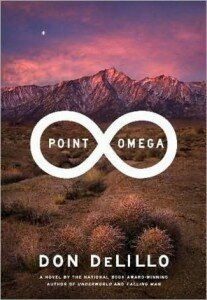‘Point Omega’
by Don DeLillo. Published by Picador; pp224; £14.99
by Bekah Lindroos

From the confines of a New York viewing gallery to the wide open spaces of the desert and then back to the gallery, this book is more philosophical than Delillo’s prior works – and it’s shorter, too. He’s talking about time and film and intimacy and death. There’s a certain suspense factor in the main part but it’s doubled because of the book-end type first and last sections.
The unnamed main characters of the New York chapter become more anonymous and isolated within the darkness of the gallery and the violence of the film, a 24-hour showing of Alfred Hitchcock’s Psycho. (Apparently DeLillo viewed parts of this and that played a part in his writing the book.)
But when film maker, Jim Finley (the viewer in the gallery?) goes to visit Richard Elster in Arizona (or somewhere in a remote southland desert) his projected stay of a few days goes on for weeks and he becomes involved on a personal level.
Elster is a 73 year-old academic who years earlier participated as a “concept” consultant in a war council regarding Iraq. He left that, as well as family in the east, to be a sort of recluse. Now Finley wants to make an “up-close-and-personal” interview type film of Elster talking about his experience in the war machine. The idea (“concept”) is that Elster would be isolated on the film, with only a blank wall behind him. The narrative is tight and tense and very word is vital.
The movie Psycho movie and the Iraq war room provide similar violent and somewhat unreal atmospheres for the two basic sections (gallery and desert) of the book. The concepts of the two films are similar in that they both want very close and detailed examinations. No broad
overviews in these flicks.
During Finley’s stay Elster’s grown daughter, Jesse, comes for a visit and the isolated characters become very connected in some complex personal way. But DeLillo keeps his narrative minimal which increases the suspense (yes!) in this section.
For the most part, DeLillo’s works since Underworld, his magnum opus, have been less than his readers expected. The Body Artist had only a smattering of positive comments and Cosmopolis virtually none. Yes, those books were definitely disappointing. Last year’s Falling
Man fared better and seemed to me a return to the Delillo of old, The Names, Mao II, etc. but with a post-9/11 American flavor.
Now Point Omega seems to hit the target getting those fine, fine sentences shaved to the minimum while maintaining a great story-line.